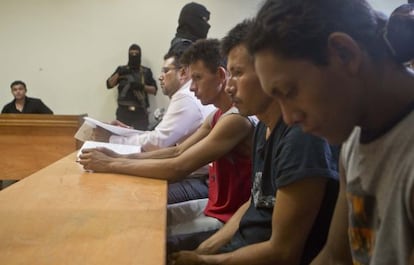Massacre of Sandinistas in Nicaragua unleashes campaign of repression
Police and military launch a witch hunt in the communities of the opposition


As Nicaraguan President Daniel Ortega shook hands with United Nations Secretary General Ban Ki-moon, he posed and smiled for the national and international press corps gathered in Managua. Meanwhile the army was launching a witch hunt in the communities that have openly declared their opposition to the Sandinista National Liberation Front (FSLN). The military is searching for the culprits of a massacre that took place on July 19, the anniversary of the Popular Sandinista Revolution. Two caravans of FSLN sympathizers were riddled with bullets. Five people died and 19 others were injured. The family members of the arrested suspects say they have been missing since they were captured while human rights organizations accuse the government of promoting repression with impunity.
On Wednesday, new arrests were announced. The detainees were taken to a prison in Managua, known as El Chipote, a facility famous for several cases of human rights abuse that have taken place under the Ortega administration. The Nicaraguan Center of Human Rights (CENIDH) has issued detailed reports of these cases.
The family members of Zacarías Cano Angulo were crying bitter tears outside in front of the detention center. Cano Angulo is a farmer from San Ramón, Matagalpa, about 190 kilometers from Managua. According to what his relatives told the local press, military officers arrested him at 7am on Saturday morning. He was hit, hooded, and dragged against his will. His wife, Aura Reynosa García, said she asked the military for an arrest warrant but the officers only responded: “The police sent us.”
Nicaragua’s police chief, Aminta Granera, said she will not spare “time, effort, sweat or blood” in her quest to clear up the events of July 19. Human rights groups say Granera, a loyal Ortega supporter, is fulfilling her promise down to the last detail at the expense of the detainees’ rights. The Permanent Human Rights Commission said 19 people have been arrested but five of them - like Cano Angulo - have “disappeared.” Neither the police nor the military have announced any information about their whereabouts.
Human rights groups say hooded men point out the homes of suspected members of the opposition and then officers raze them to the ground
“They held the farmers and brought charges against them after the legal time frame has elapsed. They did so to abuse, independently of the severity of the case. They never provided legal counsel or information to the family,” says Gonzalo Carrión, a CENIDH lawyer familiar with the case of three detainees who have been accused of being “conspirators” of the massacre and whose contribution was allegedly throwing rocks at the caravans to distract them.” These three men openly identified as Sandinistas. They are currently behind held in solitary confinement, without visitation privileges.
Authorities have made mistakes during the raids in these northern towns. Maritza Ruiz Espino, a school teacher and resident of Ciudad Darío (Matagalpa) told human rights organizations her house was razed to the ground at 3am in the morning by some armed men in military boots. Ruiz Espino did not know whether they were police or military officers. They broke into the house and asked for Wilfredo Balmaceda, she said. When they realized they had entered the wrong home, they say “we’re sorry” and left for Balmaceda residence, which was next door. Balmaceda was a once a councilman for an opposition party, Partido Liberal Constitucionalista.
Human rights groups say hooded men point out the homes of suspected members of the opposition and then officers raze them to the ground. “What we are seeing here is persecution, illegal razing of the homes of citizens who have absolutely nothing to do with this process,” says CPDH director Marcos Carmona.
The northern part of Nicaragua has always been the stronghold of the anti-Sandinista movement and saw the bloodiest moments of the 1980s civil war. The so-called contra guerrilla soldiers attempted to overthrow the first Sandinista government. Germán “Chaparro” Zeledón fought in that war. He says the military watches the ex-contras and they fear for their lives.
The Catholic Church in Nicaragua has expressed its concern over the current administration. On Wednesday, bishops met at the Episcopal Conference in Juigalpa, a city in the interior of the country. They discussed the crisis and the Church is expected to issue a statement.
A source close to the Conference said the bishops will urge the police to show more respect for human rights and to keep investigations concerning the events of July 19 within the law. According to the same source, the priests are familiar with the tension and fear that exist within the northern communities and they will ask authorities to avoid “creating an atmosphere of terror that might lead to more violence.”
On Tuesday, while the family members of the detainees were crying outside of the prison walls, human rights organizations visited the newsrooms of independent media outlets in Nicaragua to denounce the government’s arbitrary measures. Meanwhile, President Ortega was happily greeting Ban Ki-moon. The president spoke of his administration’s achievements in wind power and posed for the cameras. Just as the two leaders were shaking hands, CENIDH President Vilma Núñez, was presenting a devastating report in which the organization accused Ortega of institutionalizing impunity in the country.
The study said the police, Prosecutor General’s Office and the entire justice system worked in the interest of and under orders from Commandant Ortega. For Núñez, the UN Secretary General’s visit is nothing more than a smoke screen to deflect attention away from what is happening in the country. “We don’t know exactly what he [Ban Ki-moon] is doing,” the human rights activist says. “But I am sure the government will use him as a smokescreen and present Daniel Ortega as a world star that figures of international stature turn to.”
Translation: Dyane Jean François
Tu suscripción se está usando en otro dispositivo
¿Quieres añadir otro usuario a tu suscripción?
Si continúas leyendo en este dispositivo, no se podrá leer en el otro.
FlechaTu suscripción se está usando en otro dispositivo y solo puedes acceder a EL PAÍS desde un dispositivo a la vez.
Si quieres compartir tu cuenta, cambia tu suscripción a la modalidad Premium, así podrás añadir otro usuario. Cada uno accederá con su propia cuenta de email, lo que os permitirá personalizar vuestra experiencia en EL PAÍS.
¿Tienes una suscripción de empresa? Accede aquí para contratar más cuentas.
En el caso de no saber quién está usando tu cuenta, te recomendamos cambiar tu contraseña aquí.
Si decides continuar compartiendo tu cuenta, este mensaje se mostrará en tu dispositivo y en el de la otra persona que está usando tu cuenta de forma indefinida, afectando a tu experiencia de lectura. Puedes consultar aquí los términos y condiciones de la suscripción digital.








































